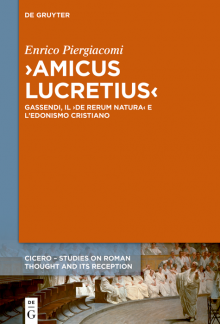- Titulinis
- Dalykinė ir mokslinė literatūra
- Humanitarinių mokslų knygos
- Filosofijos knygos
- ›Amicus Lucretius‹: Gassendi, il ›De rerum natura‹ e l'edonismo cristiano
Enrico Piergiacomi
›Amicus Lucretius‹: Gassendi, il ›De rerum natura‹ e l'edonismo cristiano
Balsavo 0
ISBN: 9783110767216
Autorius : Enrico Piergiacomi
Leidimo metai: 2022
Leidėjas: De Gruyter
Puslapių skaičius: 460
Leidinio kalba: Italų
Formatas: Kieti viršeliai
Formatas: 230×155
Autorius : Enrico Piergiacomi
Leidimo metai: 2022
Leidėjas: De Gruyter
Puslapių skaičius: 460
Leidinio kalba: Italų
Formatas: Kieti viršeliai
Formatas: 230×155
Kaina:
Šių parametrų produkto neturime
Likutis pakankamas
Iš leidyklos gausime per 3-5 savaitės. Galimas vėlavimas
Turime sandėlyje. Pristatymas Lietuvoje 1-4 d.d.
Iš leidyklos gausime per 3-5 savaitės. Galimas vėlavimas
Pristatymo sąlygos
Aprašymas
Many scholars have studied the dialogue between the Epicurean tradition and Pierre Gassendi. However, no one so far has ever attempted to conduct a full analysis of the latter’s specific reception of Lucretius. The book attempts to show that Gassendi was the first to discuss almost the whole De rerum natura, as part of an ambitious project. He sought to provide a Christianized version of Lucretius’ theory or to develop an atomistic worldview “freed” from the many dangerous errors that were often imputed to atomism (impiety, debauchery, and irrationality). In particular, Gassendi developed a dialectical strategy that led him to recover a providential atomism, an Epicurean psychology that saves the immortality of the soul, and a Christian hedonism from the De rerum natura. The last goal was especially important. Gassendi here emerges as the culmination of a tradition of Christian philosophers, like Lorenzo Valla and Erasmus of Rotterdam, who have tried to merge Epicurean hedonism with the Christian religion. The volume could therefore attract both scholars of Antiquity and Renaissance/modern philosophy. It is also a rewarding reading for scholars of the reception of Latin poetry from a philosophical perspective.
Atsiliepimai (0)
Palikite atsiliepimą

